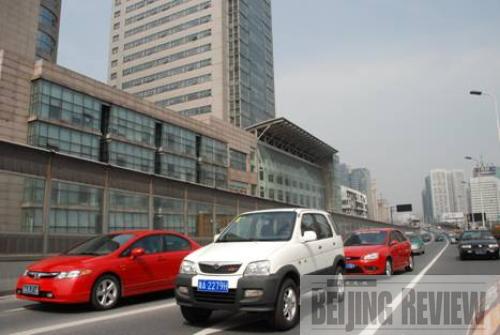|
 |
|
EMERGING POWER: Chinese auto producers are striving to be a part of the new energy auto trend under the banner of "going green" (COURTESY OF ZOTYE) |
Whenever he needed to pick up guests at the Hangzhou Xiaoshan International Airport, Wu Jianzhong, President of Zotye Holding Group, would send a Zotye 2008, China's first licensed electric car.
The vehicle is a small four-seat white SUV. It cruises at a speed of 100 km an hour along the airport expressway in keeping with the speed limit, although it could reach a maximum of 120 km per hour, said Liu Zhichao, Director of the EV Technology Department of Zotye Holding Group.
Sitting at a traffic light, the SUV, with its engine keeping quiet, does not produce the emissions or noise as most gasoline-powered vehicles do.
"Releasing the accelerator pedal while not moving, the engine is completely power-off," Liu said, adding that the auto uses 12 kwh of electricity per 100 km. Based on a price of 0.6 yuan ($0.09) per kwh, operating the car costs only 7.2 yuan ($1.06) per 100 km, or 80 percent less than a conventional auto.
"Since we usually recharge at night, and the off-peak electricity is 0.3 yuan ($0.04) in Hangzhou, it only costs 3.6 yuan ($0.53) per 100 km," Liu said.
This is a big reason why amid the global economic recession, green power is considered a viable alternative to high gas prices and the continued impact of global warming caused in part by auto emissions.
After having been engaged in auto parts manufacturing for more than two decades, Wu Jianzhong decided to launch his long-cherished dream of becoming an auto manufacturer in 2006. The rising popularity of electric vehicles was the deciding factor for him.
As for traditional auto production, China has lagged far behind developed countries. But for the new energy auto industry, the gap is not so wide, Wu said.
| 